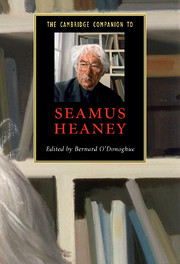Book contents
- Frontmatter
- 1 Introduction
- 2 Seamus Heaney’s Working Titles
- 3 The Context of Heaney’s Reception
- 4 Heaney in Public
- 5 Heaney and the Feminine
- 6 Heaney and Eastern Europe
- 7 Heaney’s Classics and the Bucolic
- 8 Professing Poetry
- 9 Heaney and the Irish Poetic Tradition
- 10 Irish Influence and Confluence in Heaney’s Poetry
- 11 Heaney and Yeats
- 12 Heaney’s Wordsworth and the Poetics of Displacement
- 13 Heaney, Beowulf and the Medieval Literature of the North
- 14 Crediting Marvels
- Guide to Further Reading
- Index
14 - Crediting Marvels
Heaney after 50
Published online by Cambridge University Press: 28 March 2009
- Frontmatter
- 1 Introduction
- 2 Seamus Heaney’s Working Titles
- 3 The Context of Heaney’s Reception
- 4 Heaney in Public
- 5 Heaney and the Feminine
- 6 Heaney and Eastern Europe
- 7 Heaney’s Classics and the Bucolic
- 8 Professing Poetry
- 9 Heaney and the Irish Poetic Tradition
- 10 Irish Influence and Confluence in Heaney’s Poetry
- 11 Heaney and Yeats
- 12 Heaney’s Wordsworth and the Poetics of Displacement
- 13 Heaney, Beowulf and the Medieval Literature of the North
- 14 Crediting Marvels
- Guide to Further Reading
- Index
Summary
Accrediting Poetry
In his Nobel acceptance speech of 1995, Heaney recalled the burden for his art of recent violent events in Northern Ireland, then told his audience: ‘I began a few years ago to try to make space in my reckoning and imagining for the marvellous as well as for the murderous’ (CP 20). This is one of the several occasions on which the Nobel lecture and the recent poems expressly connect, for in ‘Fosterling’ from Seeing Things (1991), having characterised his earlier poetry as ‘Sluggish in the doldrums of what happens’ – a rewriting of a happier borrowed phrase of his, ‘the music of what happens’ – he suddenly refers to himself in apparent reproach: ‘Me waiting until I was nearly fifty / To credit marvels’ (ST 50). There is surprise expressed here, too, as when we ask of some event that stretches credulity, ‘Would you credit it?’ The surprise would seem to be the length of time it has taken for him to register the marvellous in his past (though the abbreviated syntax makes this ambiguous): ‘So long for air to brighten, / Time to be dazzled and the heart to lighten’. So marvels happen too, but uncommonly enough to provoke wonder: marvel, via Middle English from Old French merveille from Latin mirabilia, ‘wonderful things’. The miracle, from Latin miraculum, a thing wondered at, is not far away from the marvel though Heaney often avoids a specifically Christian (i.e. Roman Catholic) credence.
To ‘credit’ marvels is of course to believe in marvels, and belief is one of the impelling forces in Heaney’s poetry. But it is also to trust in the marvellous (as the credit union trusts in our ability to pay back our loans), and in his recent poetry Heaney trusts so much in the marvellous that it can seem to the reader to have been almost commonplace in his boyhood and youth, capable of transforming – in memory if not at the time – even the apparently sluggish. He is (wittingly or no) following his fellow Ulster poet Patrick Kavanagh in this new heightened sensitivity to the marvellous and the ease of turning everyday brass into visionary gold, though it was as early as his first volume of poetry (1936) that Kavanagh claimed to have found ‘a star-lovely art / In a dark sod’ (‘Ploughman’) and went on to report ‘the thrill / Of common things raised up to angelhood’ (‘Pursuit of an Ideal’). Heaney’s by contrast has been a delayed and, one feels, a more conscious receptivity to the wondrous inherent in the commonplace.
- Type
- Chapter
- Information
- The Cambridge Companion to Seamus Heaney , pp. 206 - 223Publisher: Cambridge University PressPrint publication year: 2008
- 2
- Cited by

